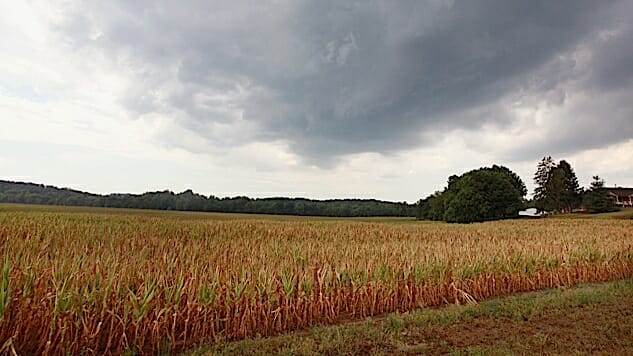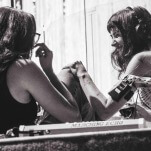Us Too: One Man’s Experience of Sexual Assault, and How It Opened His Eyes
Photo by Scott Olson/Getty
In the winter of 2011 I drove from central Georgia to northern Michigan with my ex-girlfriend and 18-month-old dog Wendy to spend the holidays with her parents (the girlfriend’s; not the dog’s). We took I-65 north up through the barren guts of Indiana, splitting snowy fields dotted with corn stumps that in more fertile months are combed by irrigation arms a hundred yards long, but which then lay long and cold and idle. We stopped for gas at a Flying J truck stop just south of Indianapolis.
See where this is going?
Wendy had never seen snow and went ballistic when we let her out. I sang Zappa as she peed, then went inside to do the same.
The bathroom was one of those palatial trucker-centric deals with about five urinals and 99 stalls, plus showers. That day, it was empty except for one man by the sink. He watched me pass, and I nodded in that instinctive, unfriendly way you sometimes nod to break up a weird moment, to assert yourself or something close to that. Anyway, he didn’t nod back, and I felt his eyes on me as I approached my selected urinal and relieved myself. In a few seconds he was beside me, and he leaned over and looked at my dick in my hands. I looked at him incredulously and he looked me in the face, in the eyes, and he angled his head suggestively, then put his hand on my shoulder.
I’m not tall, and he was my size, a little shorter, and looked like he was in his mid-fifties or a hard late-forties. He wore a ball cap and a flannel shirt with an off-white tee underneath that had a stretched collar. His face had weathered and leathered like he’d been smoking since high school, and he probably weighed less than me, in an unhealthy way.
It’s a photograph in memory, and though those details seem indelible, I’m also aware that the more you recall something, the more it drifts from reality. But what’s reality? My memory is the only reality accessible to me, and this is what I recall. The other indelible thing: His hand on my shoulder. When I pull up the memory I feel his fingertips, like hair-raising nodes on a Van der Graaf sphere, then his palm. It’s a tattoo. I don’t recall it often.
At his touch I froze, except for the pee. And I still don’t know why I didn’t punch him in the face, why “fight” wasn’t my instinct, especially given that he was smaller than me. I still feel shame about that, too, cultural but maybe also biological, though that attribution might also be cultural, who knows. But thanks to other men, I also know that reaction was normal and even to be expected. The experience, as you no doubt already understand, was small potatoes compared to so many other #MeToo stories, but it gave me an understanding of what so, so many women, and many men, experience: A certain power dynamic, especially with an older man, can make you feel like a child.
All I did was jerk my shoulder, which seemed to get the point across. The dude went back to sit on the sink, where he watched me finish up, dangling his legs like a damn kid on a swing. I had to pass him about four feet away to get out of there. He didn’t reach out again.
Back in the store I found my girlfriend in the chips aisle looking for sour cream and onion Pringles. I told her we had to leave. Dude came out of the bathroom, head swiveling, and I ran her out of there and didn’t tell her what happened until we were back on the Interstate.
I Am Man, Hear Me Whimper
In the intervening six years I’ve told perhaps ten people, most of them in the last couple of months.
There’s a strange shame about sharing this story I still can’t shake. First of all, as I mentioned before and want to make clear, it’s comparatively not that big a deal. I mean, it’s not exactly harrowing. The only lasting effects (I think) are that shadow hand on my shoulder and an uneasiness alone in gas station bathrooms, which I’ll probably never lose. I don’t want to put myself in the same camp as survivors of rape, incest, molestation, and other physical abuse. I don’t belong there. But that doesn’t mean stories like mine don’t belong somewhere.
So go ahead, say I’m bandwagoning, or desperate for attention or affection—fine, but you can go straight to hell. I write for a reason: Men.
Men and women everywhere know this same shame, but as a result of different cultural pressures. As you can imagine, machismo is a powerful filter. It’s “weak” to endure abuse. It’s “weak” to discuss abuse. Perversely, it’s also “weak” not to own your emotions and speak your truth, even if it’s small.
See how tricky it is? You encounter shame traps and blame traps all over the place. What will your friends think of you? What will your family think of you? What will your significant other think of you? It’s much easier to closet the story than negotiate those pitfalls. Hell, it’s tradition for us to wrestle in private with ourselves. Women obviously endure overwhelming cultural pressures to shut up and repress, but for men, though I’m speaking from my own experience and am hesitant to generalize, there seems to be a unique brand of shame.
But it’s not shameful or weak to endure it; it’s not weak to repress; it’s not weak to express; it’s not weak to cry and ask for help, or ask for someone to listen; and it’s not weak to be afraid to confront it yourself. But if you don’t drag it out into the light, you won’t ever be able to see it for what it is, and you won’t be able to get any perspective—you can only get that from other people. And you won’t be able to find forgiveness, because that only comes from perspective. I’m thankful for all the people who have shared their stories, from the unspeakably violent to workplace harassment, because their stories make it easier on other people to live their lives.
That’s why I chose to join the chorus of people more courageous than I who have reminded us that men are sexually assaulted all the time. The truth is a great many of us can’t and don’t do all that much to stop it, even if we seem physically able and prepared to handle ourselves. But it’s not physical—it’s instinct and psychology, and we react the same way women do because we’re all people and all susceptible to the same intangible, ineffable weaknesses. Some women rage and fight against their attackers, and more power to them. Some women don’t or can’t, and more power to them, too. I didn’t let Toilet Man go far, but I also didn’t react the way I in hindsight felt I was “supposed” to.
If you knew how that feels, you’d never, ever blame, shame, or doubt any victim of assault ever again.
I’ll end on this: In the last year, five of my closest friends have confessed (or themselves exhibited) they were abused or were being abused in relationships. Not just emotionally, but physically, too. By women. Some of these friends are meek artistic types, and some are bewilderingly big dudes with beards. All in the last year.
This happens to men more frequently than I, and probably you, will ever really know. We should pay attention to men. Respect their experiences. Listen, and do what you can to make it easier for people to live their lives.







































